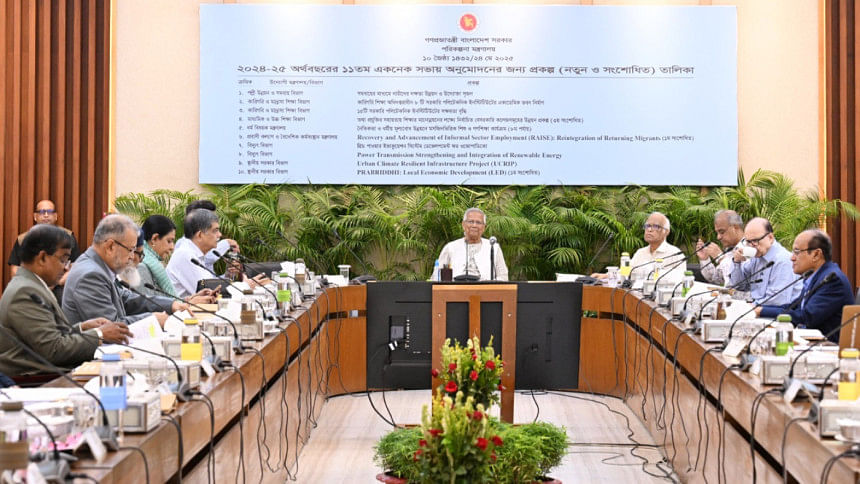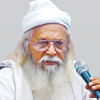Yunus to stay the course

Amid simmering political tensions, the interim government has said it will not abandon its responsibilities and that Chief Adviser Muhammad Yunus is not stepping down.
"We're not going anywhere until our job is done," said Wahiduddin Mahmud, planning adviser, following an unscheduled meeting of the advisers yesterday.
The announcement follows reports that Prof Yunus on Thursday expressed his desire to resign.
The two-hour meeting presided over by Prof Yunus focused on election, reforms, and trial -- the three core responsibilities of the interim government, said a statement.
"The future of the country depends on this task, and we must keep going despite the obstacles," Mahmud said.
The advisory council later issued a statement, calling for national unity to ensure a fair election and stability. The council also expressed concerns over attempts to hamper the functioning of the administration.
However, if -- under the instigation of defeated forces or as part of a foreign conspiracy -- the performance of these responsibilities becomes impossible, the government will present all reasons to the public and then take the necessary steps with the people.
The statement said that "unreasonable demands, deliberately provocative and jurisdictionally overreaching statements, and disruptive programmes have been continuously obstructing normal functioning environment and creating confusion and suspicion among the public."
Despite these challenges, the government said, it would continue to carry out its duties, placing national interest above all else.
"However, if -- under the instigation of defeated forces or as part of a foreign conspiracy -- the performance of these responsibilities becomes impossible, the government will present all reasons to the public and then take the necessary steps with the people."
While briefing reporters after the unscheduled meeting of the advisory council, Mahmud said, "The chief adviser will be with us. He has not said he will resign. The other advisers are also staying. We have been given responsibilities, and we are here to fulfill them."
Mahmud said the advisers discussed the obstacles hindering the fulfillment of their responsibilities.
He said the government's primary task is to establish the framework for the upcoming election and the transition to a well-governed democratic system on a broader scale.
"We have tried to identify the obstacles and their sources. We call upon all forces supporting the popular uprising, all state institutions, to assist us in achieving this goal. This is not solely our responsibility. We seek the cooperation of all political parties, administrative bodies, various institutions, and the judiciary in reaching this objective."
Asked about demands for resignation of several advisers including himself, Mahmud said that the remarks made against him were not official party statements. "So, if it were truly a party decision, any of us could have resigned," he said.
According to multiple sources present at this and Thursday's advisory council meeting, several advisers requested Prof Yunus to present a roadmap for the next national election as soon as possible.
The chief adviser had not expressed his opinion on the matter, they added.
The first meeting was held on Thursday morning at the CA Office.
Election roadmap figured high at both meetings. But Mahmud declined to comment when asked whether the roadmap was discussed at yesterday's meeting.
A source said that during Thursday's meeting, an adviser opined that the national election could be held in either February or April next year.
The adviser said the announcement of such a tentative timeline could help calm the current political situation and reinforce the chief adviser's earlier statement that the election would be held within June 2026.
The adviser added that political parties may respond positively when there is clarity. He further emphasised the importance of going ahead with the trial of July killings and the reform process.
Another source said the advisers grew concerned as the BNP and several other parties are demanding the election be held by December.
If Prof Yunus hints at holding elections in any specific month after December this year and before June next year, it could offer a middle ground, said the source quoting the adviser.
Such an indication would prevent criticisms that the government's election roadmap was announced under political or non-political pressure, while also meeting the expectations of political parties, added the source.
A high-level government source said Prof Yunus had expressed frustration because in his opinion, the political parties showed a lack of patience even after he announced a probable timeline.
It was out of disappointment that Prof Yunus had earlier expressed his wish to step down, said the source.
However, at the meeting yesterday, the chief adviser told his colleagues to forget what he had said in anger.
"We must meet the people's expectations and complete the necessary tasks with full responsibility," Prof Yunus was quoted as saying.
A source said the chief adviser appeared much more relaxed compared to the last two days. However, traces of the intense pressure he had been under were still visible on his face.

 For all latest news, follow The Daily Star's Google News channel.
For all latest news, follow The Daily Star's Google News channel. 







Comments